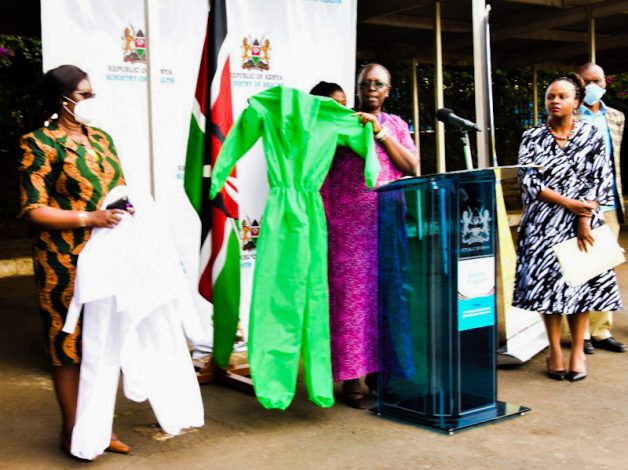This content has been archived. It may no longer be relevant
The Kenya Association of Manufacturers (KAM) has partnered with Kenya Fashion Council (KFC) to sew masks to meet local demand.
This is in an effort to better support the country’s COVID-19 response.
Face masks are one of the many critical non-pharmaceutical supplies that local industries have the capacity to produce for use by healthcare providers and the public.
KAM published a list of 17 local manufacturers who produce the material (Non-Woven Polypropylene) needed to manufacture 3-ply face masks (due to their high filtration ability).
Non-woven fabrics manufacturers are Ecobags Industries Limited(Nairobi), Fab non-woven Kenya(Eldoret), Foam mattress Limited (Kisumu), JumboNile (Kisumu) and Kenafric industries,NES polypack and Packaging Industries Limited, all based at Nairobi Industrial Area.
Woven and knitted fabrics manufacturers are Alpha Knits Limited(Ruiru), Bedi Investments Limited (Nakuru), Chalange Industries (Nairobi), Ken-Knit (Kenya) Ltd-Eldoret, Nakuru Blankets and Rivatex (East Afric-Eldoret, Spinners & Spinners (Ruiru), Sunflag Textiles and Knitwear(Nairobi) Supra Textiles (Nairobi) and Thika Cloth Mills.
KAM Chief Executive, Ms Phylis Wakiaga remarked that working with KFC will give SMEs in the Textiles and Apparels Sector an opportunity to seal gaps in the local value chain as all stakeholders work together to curb the spread of the virus.
She also reaffirmed industry’s commitment to working with the government to relieve the ever-increasing demand for the much-needed critical items in the country, as we seek to curb the exposure and spread of coronavirus.
“The manufacturing sector is committed to support various on-going initiatives to mitigate the spread of the virus throughout the country. This includes the continued production of essential goods and services whilst remaining ethical and fair in pricing to enable, especially SMEs and those whose daily wage will be greatly impacted by the pandemic, to cater to their basic needs. Local manufacturers have also increased their production of the critical items to meet the increasing demand.” added Ms Wakiaga.
The Cabinet Secretary for Industrialization, Trade and Enterprise Development, Ms Betty Maina acknowledged Kenyan manufacturers’ capacity to produce the critical items, noting, “The local textile industry now has the capacity to produce masks locally. We shall work with Kenyan manufacturers to produce as much of the critical medical items as we can locally, to bridge the shortage of materials.”
CS Maina added that the prod7uction of these items shall begin immediately.
“We have approved the production of critical items. We shall immediately commence the production of fabric to be used to sew 60 million masks. The fabric shall then be sold to tailors all over the country to make them accessible to all citizens. We are replacing the global supply chain by producing the items locally,” she added.




